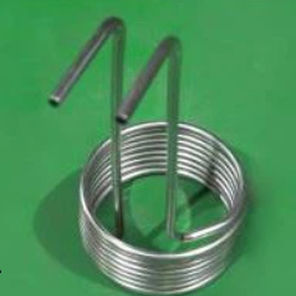
- Industrial machines and equipment
- Heat Exchanger and Refrigeration
- Spiral heat exchanger
- Shaanxi CXMET Technology Co., Ltd.
Spiral heat exchanger titaniumcorrosion-resistantindustrial
Add to favorites
Compare this product
Characteristics
- Type
- spiral
- Material
- titanium
- Other characteristics
- corrosion-resistant
- Applications
- industrial
Description
In practice, the heat transfer effect of the heat exchanger is closely related to the material and process characteristics of the heat exchanger. In the process of concentration, solute or impurity often deposit and crystallize on the heating surface to form scale layer, which affects heat transfer. Some solutes are thermally sensitive and perishable if they stay too long at high temperatures. Some materials have higher corrosive or higher viscosity and so on.
Physical properties
Titanium heat exchanger is made of high-quality titanium tube. In physical properties, titanium tube has the advantages of light weight, superior mechanical properties and so on. The tensile strength of pure titanium is up to 180kg/mm2. Some steels are stronger than titanium alloys, but the specific strength (the ratio of tensile strength to density) of titanium alloys exceeds that of high-quality steels. In addition, titanium alloy has good heat resistance, low temperature toughness and fracture toughness .
Chemical properties
Chemically, titanium exhibits good stability and corrosion resistance in various industrial solutions. Industrial pure titanium is an excellent accessory material for refrigeration equipment.
Industrial pure titanium can be widely used in organic compounds, alkali solution, salt solution and other media, and is not easy to react with it, good corrosion resistance; Pure titanium has good corrosion resistance to low concentration of hydrochloric acid, sulfuric acid, nitric acid and other inorganic acids at room temperature.
Catalogs
No catalogs are available for this product.
See all of Shaanxi CXMET Technology Co., Ltd.‘s catalogsOther Shaanxi CXMET Technology Co., Ltd. products
Titanium Materials
*Prices are pre-tax. They exclude delivery charges and customs duties and do not include additional charges for installation or activation options. Prices are indicative only and may vary by country, with changes to the cost of raw materials and exchange rates.









